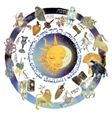ज्योतिषशास्त्र की दृष्टि में धन वैभव और सुख के लिए कुण्डली में मौजूद धनदायक योग या लक्ष्मी योग काफी महत्वपूर्ण होते हैं. जन्म कुण्डली एवं चंद्र कुंडली में विशेष धन योग तब बनते हैं जब जन्म व चंद्र कुंडली में यदि द्वितीय भाव का स्वामी एकादश भाव में और एकादशेश दूसरे भाव में स्थित हो अथवा द्वितीयेश एवं एकादशेश एक साथ व नवमेश द्वारा दृष्ट हो तो व्यक्ति धनवान होता है.
FOR MORE INFO.
PLEASE CONTACT US
Jyotisha (or Jyotish from Sanskrit jyotiṣa, from jyótis- “light, heavenly body”) is the traditional Hindu system of astronomy and astrology. It is also known as Hindu astrology, Indian astrology, and more recently Vedic astrology. The term Hindu astrology has been in use as the English equivalent of Jyotiṣa since the early 19th century, whereasVedic astrology is a relatively recent term, entering common usage in the 1980s with self-help publications on Āyurveda or Yoga. Vedanga Jyotisha is one of the earliest texts about astronomy within the Vedas. However, historical documentation shows that horoscopic astrology in the Indian subcontinent came from Hellenistic influences, post-dating the Vedic period.
Jyotisha has been divided into three main branches:
Siddhānta: Indian astronomy.
Saṁhitā: Mundane astrology, predicting important events related to countries such as war, earthquakes, political events, financial positions, electional astrology, house and construction related matters (Vāstu Śāstra), animals, portents, omens, and so on.
Horā: Predictive astrology in detail.
Following a judgement of the Andhra Pradesh High Court in 2001, which favoured astrology, some Indian universities offer advanced degrees in astrology.
Further information: Indian astronomy and Hindu chronology
Jyotiṣa is one of the Vedāṅga, the six auxiliary disciplines used to support Vedic rituals.[6]:376 Early jyotiṣa is concerned with the preparation of a calendar to fix the date of sacrificial rituals.[6]:377 Nothing is written on planets. There are mentions of eclipse causing “demons” in the Atharvaveda and Chāndogya Upaniṣad, the Chāndogya mentioning Rāhu. In fact the term graha, which is now taken to mean planet, originally meant demon. The Ṛgveda also mentions an eclipse causing demon, Svarbhānu, however the specific term of “graha” becomes applied to Svarbhānu in the later Mahābhārata and Rāmāyaṇa.
The foundation of Hindu astrology is the notion of bandhu of the Vedas, (scriptures), which is the connection between the microcosm and the macrocosm. Practice relies primarily on the sidereal zodiac, which is different from the tropical zodiac used in Western (Hellenistic) astrology in that an ayanāṁśa adjustment is made for the gradual precession of the vernal equinox. Hindu astrology includes several nuanced sub-systems of interpretation and prediction with elements not found in Hellenistic astrology, such as its system of lunar mansions (Nakṣatra). It was only after the transmission of Hellenistic astrology that the order of planets in India was fixed in that of the seven-day week. Hellenistic astrology and astronomy also transmitted the twelve zodiacal signs beginning with Aries and the twelve astrological places beginning with the ascendant.[6]:384 The first evidence of the introduction of Greek astrology to India is the Yavanajātaka which dates to the early centuries CE. The Yavanajātaka (“Sayings of the Greeks”) was translated from Greek to Sanskrit by Yavaneśvara during the 2nd century CE, under the patronage of the Western Satrap Saka king Rudradaman I, and is considered the first Indian astrological treatise in the Sanskrit language.[8] However the only version that survives is the later verse version of Sphujidhvaja which dates to AD 270. The first Indian astronomical text to define the weekday was the Āryabhaṭīya of Āryabhaṭa (born AD 476).
According to Michio Yano, Indian astronomers must have been occupied with the task of Indianizing and Sanskritizing Greek astronomy during the 300 or so years between the first Yavanajataka and the Āryabhaṭīya. The astronomical texts of these 300 years are lost. The later Pañcasiddhāntikā of Varāhamihira
